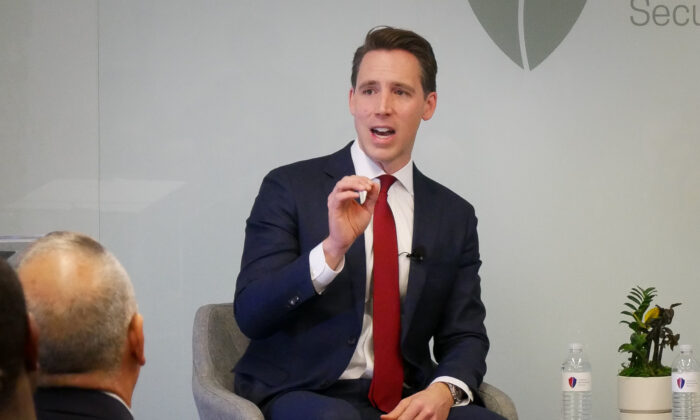WASHINGTON—Sen. Josh Hawley (R-Mo.) said on Nov. 12 that the situation in Hong Kong displays Beijing’s real intention, which is to push the United States out of the Indo-Pacific region, and that current U.S. foreign policy is inadequate to address the “dangers at hand.”
Speaking at the Center for a New American Security, a bipartisan think tank, Hawley called for a change in foreign policy approach in light of a new era of competition with China.
“China’s bid for domination is the greatest security threat to this country in this century, and our foreign policy around the globe must be oriented to this challenge and focused principally on this threat,” he said.
The youngest member of the U.S. Senate said the Chinese Communist Party’s response to the Hong Kong pro-democracy protests shows clearly “what Beijing is capable of, what Beijing’s intentions are.”
“First Hong Kong, then Taiwan, then the whole region,” he said, adding that the Chinese regime “has already been telegraphing” that it wants “to shut us out of the region.”
Chinese domination is a direct threat to U.S. national security and prosperity, Hawley said.
“The Indo-Pacific is a region that is absolutely vital to us. We have to be able to trade in that region. We have to be able to have access to that region on free and equal terms,” he said, noting the importance of the region for the “prosperity of our middle and working class.”
He argued that U.S. foreign policy should address the new challenge and “make sure China does not become an imperial power that dominates the region and the international system.”
‘Berlin of This Generation’
The freshman senator visited Hong Kong last month and spoke with activists on the street. After his trip, he introduced the “Hong Kong Be Water Act,” together with Sens. Rick Scott (R-Fla.), and John Cornyn (R-Texas), calling for the use of the Global Magnitsky Act to sanction Chinese and Hong Kong officials responsible for suppressing freedoms in the city.
“I do think that Hong Kong is the Berlin of this generation, in the sense that it captures and makes vivid the struggle that this generation is going to have, which is with an increasingly martial and expansionist China,” Hawley said. “And that’s what we’re seeing play out in Hong Kong.”
The House on Oct. 15 unanimously passed the Hong Kong Human Rights and Democracy Act. The bill would require the U.S. government to conduct an annual review as to whether Hong Kong is “sufficiently autonomous” from mainland China to retain its special trading privileges with the United States.
The Senate hasn’t yet passed its version of the bill.
“I don’t know why we’re not voting on the Hong Kong Human Rights and Democracy Act,” Hawley said. “I hope that we’ll vote this week.”
Since June, mass protests have erupted on Hong Kong streets over fear that a now-withdrawn extradition bill would lead the Chinese Communist Party to expand its influence in the city. The demonstrations have since evolved into a movement advocating for universal suffrage and greater freedoms.
Hawley has been an outspoken critic of U.S. companies that have kowtowed to the demands of the Chinese regime.
“What we’ve seen with the NBA, Disney, and others is, I think, a preview of coming attractions,” he said, adding that U.S. companies shouldn’t “become arms of the Chinese Communist Party’s propaganda machine.”
‘Progressive Universalism’
The Missouri senator also criticized the present foreign policy consensus embraced by both political parties, calling it “progressive universalism.” He said the United States still lives with “a post-Cold War hangover.”
“It is my argument to you today that our present foreign policy consensus, the cast of mind and expectations embraced by both major parties for the last 20 years, is not adequate to our time and it is not right for our future,” he said. “This consensus has left us distracted from the dangers at hand. It has left us unprepared for the challenges we face, and it has been rejected by the people in this country.”
Hawley said that progressive universalism has pushed for “multilateral rules-based patterns of cooperation with the entire international system,” and prioritized international institutions such as the North Atlantic Treaty Organization and the United Nations.
This article is from the Internet:Beijing’s Treatment of Hong Kong Displays Its Ambitions in Asia, Hawley Says
Supreme Court Justices Appear Inclined to Allow Trump to Terminate DACA
